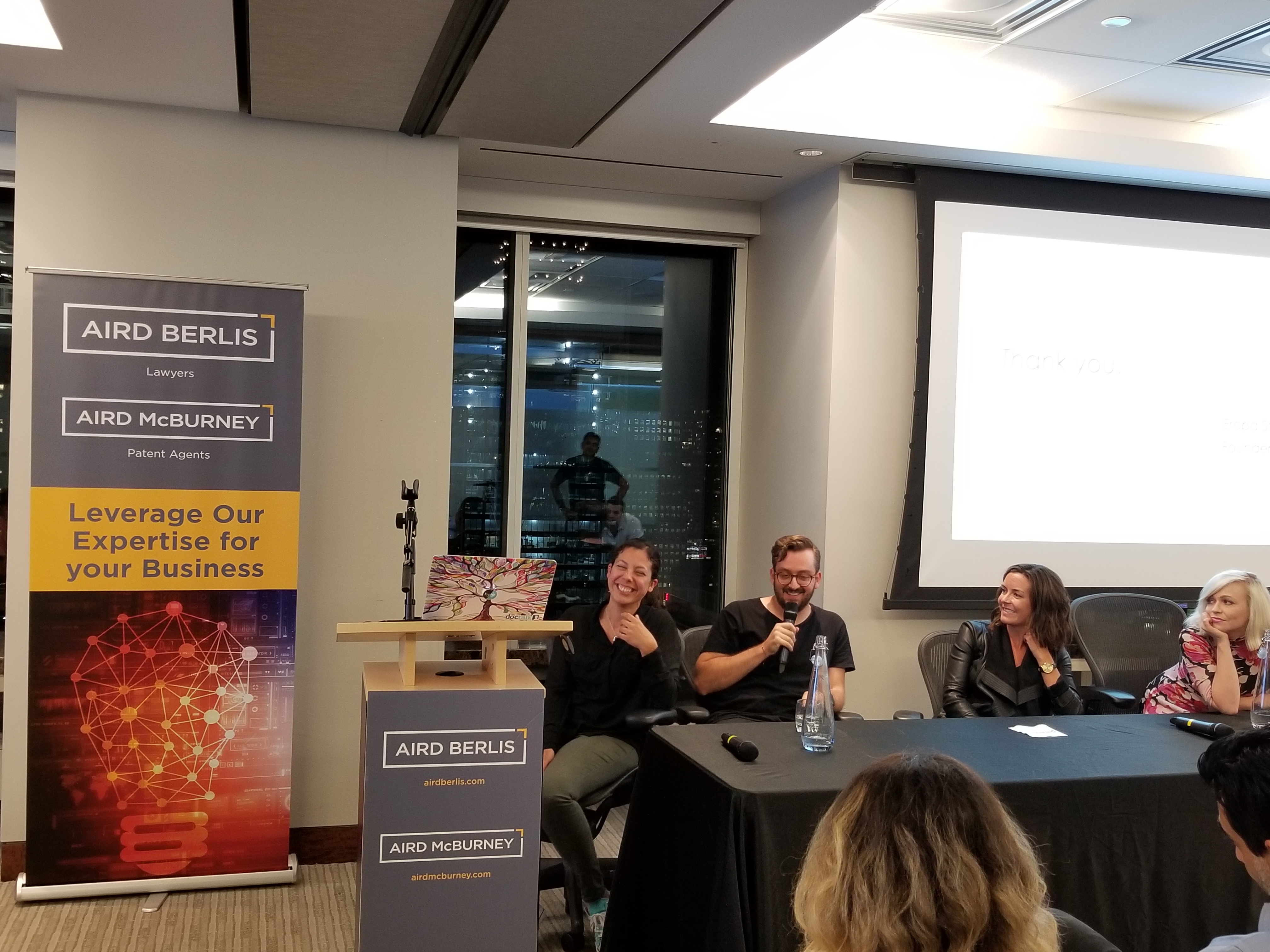Featured Interview - John Zupancic, CEO and Founder of Wriber

We interviewed John Zupancic, CEO and founder of Wriber, to learn from his experience launching and running a startup in Ontario. Wriber is a technology company that helps brands and agencies create optimized content for their audiences. Its artificial intelligence helps users research and structure content by suggesting ideas, facts, and quotes.
Wriber has, or has had, affiliations with several of the province’s leading incubators and accelerator programs. It is an example of a company that is immersing itself in Ontario’s startup culture and using the available resources to gain a competitive edge.
Wriber operates at the intersection of marketing and artificial intelligence. What can you tell us about the products and services Wriber offers? What market gap do you fill?
Wriber is a SaaS [software as a service] platform that helps digital marketers create content to help them generate more traffic. That’s our main offering. Our goal is to drive up the level of engagement people generate from the content they release. There are a lot of different components to this – first, we make recommendations that help people do lots of research, because research takes a lot of time. Secondly, we check to make sure the content they’re producing is actually awesome. This includes checking the length of an article, breaking it up into paragraphs to make it easier to read, checking for desirable SEO (Search Engine Optimization) qualities, checking for voice… essentially, Wriber is an advanced text editor with tools that help you create content.
As for the market gap – a lot of companies help syndicate and measure engagement, which creates a market need for more content. We are the software that helps people create great content more quickly. Most of our customers say their biggest challenge is time – they have a million things to do, and writing a blog isn’t necessarily at the top of their list. Our goal is to make it less stressful.
In your industry, intellectual property is often the major driver of competitive advantage. How did you approach the task of creating your IP strategy?
Startups don’t usually have the resources to enforce their IP rights. At the end of the day, if Google or someone comes along and snags your algorithm, there’s not much you can do. It takes a while before you can start thinking about actually enforcing your patent.
Where IP becomes helpful is by putting a “stake in the ground”… it’s the first step to becoming competitive. A lot of investors won’t even talk to you if you don’t have your IP in order. It’s a big checkbox for investors to see that you’ve filed patents and are getting them at some point. It also signals that you’re creating something novel. But the actual return on the patent will probably come way later. Founders are focused on building the business, and the patents are a checkmark in that process.
Many founders talk about the “art of the pivot”. What can you tell us about Wriber’s pivots and the importance of staying agile?
Being agile is about being open to feedback. I don’t like the term pivot. Starting a company is not a one-shot approach. Product-market fit is important, and it requires iteration.
When we started, we were focused on the productivity pitch – we talked a lot about how people create content, but that didn’t resonate. People cared more about getting traffic and leads to their website. They didn’t want to write more content, they wanted to write better content. So we switched from an AI that automates writing to something that helps you get more results with your content.
Although the underlying tech is pretty much the same, it was a big change. It’s really hard to quantify productivity – when you ask people to do that, they usually talk about traffic, not the hours they put in or whatever. So being able to show that Wriber gives you three times or five times the leads… it allowed us to build stronger business cases.
How has your role in the firm evolved over time, and how do you expect it to change in the future?
I’ve gone through cycles. I’ve been heavy on dev (software development) sometimes, heavy on sales sometimes. As a sole founder it’s incredibly difficult to balance things – I’ve often found that I end up not doing anything well. If I try to do both dev and sales at the same time I usually get neither, so I focus on one, so that I, at least get one thing done.
You often hear about founders who wear several hats, but I’ve found that for my own productivity, I get stuff done faster if I focus on one. I think that will change in time. Right now we’re still a small team, but I assume there’s more delegation as you get larger.
What can you tell us about your financing strategy for Wriber, and your personal views on the tradeoff between raising capital and preserving control?
Ideally, startups want to fund themselves. I don’t know any founder that wants to raise money for the sake of raising money. Ideally you don’t need much money, so you don’t have to raise much. Sometimes it’s hard – if you need tremendous R&D for example, and you’re pre-revenue and need cash to stay alive.
So we look to local angels here in Waterloo. We’ve done that. I’ve found value in having experienced investors who have built businesses themselves – it’s easier when they’re on the same page and want the business to succeed for the same reasons you do.
Some of the founders that StartupSource has interviewed in the past noted that it’s harder to raise funds in Toronto than, say, New York or Silicon Valley. Do you agree?
Yes, it’s harder. The further east you go, the harder it gets. I don’t have the exact figures, but even the number VC firms here is an order of magnitude smaller. Also, investors in Canada tend to be more conservative.
Still, I have investors here and have no problem with it. There are always tradeoffs – maybe there’s more money elsewhere, but maybe it’s also harder to access. Investors in the US don’t invest as much in Canadian firms.
Let’s talk about your background. You graduated from the University of Waterloo’s Master of Business, Entrepreneurship and Technology (MBET) program, which has rapidly developed a reputation for grooming tech-minded entrepreneurs. What made you choose the MBET over a more traditional graduate business degree like an MBA?
I was always one of the kids who played around with technology. I used to fix VCRs and stuff. I didn’t have a very good high school guidance counselor… I did two majors during undergrad, business and computer science. I started off in the business program at Laurier and realized people just wanted to be accountants and stuff. I didn’t find it too interesting.
Then I went to Waterloo. It was very different from Laurier – there was a huge ecosystem for entrepreneurs. It was awesome. At some point I sat down with the MBET program’s founding director and asked him: I have a business and a computer science degree, what do I need you for?
I found out the MBET experience was geared towards starting a company, not just running a company. The classes were highly specialized for entrepreneurs. I learned how to pitch, how to talk to people. I got a great network out of it. I had really struggled to get through the program at Laurier – I almost got kicked out a couple of times because I wasn’t engaged and didn’t find it interesting. But then I was top of my class in the MBET program at Waterloo.
Following in the footsteps of many nimbler startups like Wriber, Google opened their largest Canadian R&D facility to date in Waterloo in early 2016. What makes the Kitchener-Waterloo region so attractive to technology firms?
Waterloo has a great network of angel investors. Organizations like the Garage Capital and the Golden Triangle Angel Network, those are the formal ones… some of my investors are members of Golden Triangle. One of my professors at Waterloo was a member – he saw our presentation, really liked it and got to know me, realized I was serious, and went and rallied other investors. The investor network has provided continuous value to me personally.
There’s also a wealth of talent here. That’s why Google is here, I think. The University of Waterloo is producing really awesome engineers and I think that’s what’s making it. They’re trying to form technology clusters. You have a town with two universities and a college – a wealth of younger potential job candidates. But if you ask startups, their number one problem is always recruiting. Engineers from Waterloo get a lot of offers from companies like Facebook and Google. It’s still a very entrepreneurial community, though.
If you had ten minutes with a senior government official in charge of regulating Canadian startups, what would you ask them to change?
The government has done a great job with their funding programs – I’d say keep it up and maintain that velocity. There are a lot of government grants here, things like SR&ED [Scientific Research and Education Development grant]. Those are great. They have some similar programs in the US but I think they’re very focused on commercialization rather than research. I don’t know which one makes more sense.
One challenge we’ve had with government funding was when we took our first grant of $25k, and then a year later, the same grant offered $60k but we weren’t eligible because we had already accepted the first grant. They didn’t even make up the difference – we were just not eligible. That was something that we experienced.
Also, the government doesn’t use the best metrics to measure the value that accelerators and incubators are adding. Things like number of employees, for example, they’re not necessarily the best measure of value. There’s a lot of double dipping. We’re part of the Laurier accelerator program, and we were in Waterloo’s Velocity incubator, and now that we’re finally showing results, it’s incredible difficult to attribute that success and identify who did what.
You’ve experienced a lot in a very short amount of time. What is the one thing you know now that you wish you had known at the start of your journey?
I wish we had charged for our software earlier, and I wish we didn’t build as much as we did. This is just a startup problem: if you have an idea and you go out and get feedback on it, the issue comes up when the people giving you feedback have no skin in the game. You end up chasing your own tail. People say something and it seems awesome, so you fix your product and go back, and you find they’re still not willing to purchase.
I wish we’d known that, because we wasted a lot of time in dev mode not talking to customers. I kind of focused a lot on tech, but tech should never be prioritized over customers, otherwise you’re just locked in a cave writing code. That was a problem that personally cost me a lot of money and time.
Who were some of your most influential mentors, and what did you learn from them? Feel free to name names.
I have a lot of mentors, but two definitely stand out to me. Doug Beynon is a professor at Waterloo, and the entrepreneur in residence. He was pretty influential in the sense that he believed in us early on, when we had a lot of negative feedback from people who said what we were doing was impossible. Before, I’d go into a pitch competition and say, we’re building this – and I’d burn up in flames and get laughed out of the room. “You can’t build that, you’ve got PhDs at Google trying to build that.” Doug was the guy that believed in me.
Wes Worsfold, my mentor from the Velocity accelerator at the University of Waterloo, has also been fantastic. He’s been a very well rounded person that helped us a lot with lots of advice, honest feedback on everything from sales to product management. Even though I graduated from the Velocity program, he still provides a lot of feedback – if I have a problem, I’m usually going to him about it.
If a millennial approached you today saying she wanted to found a technology startup, what advice would you give him or her?
Oh boy, probably a lot of advice. Picking one thing is hard. Find a good cofounder. Find a product that solves a “hair on fire” problem. Make sure people have skin in the game. When you’re told to make a minimum viable product, that doesn’t mean you build a product with five features – it means one product with one feature that works incredibly well.
I have so much advice to give. I’d probably focus on how it’s better to make a small group of people really, really happy than to focus on a large group. It’s easier to turn a small group that loves you into a lot of people that like you, than to go from a small group that likes you to a lot that love you.
Anything else you’d like to share?
If your company’s struggling to generate content, come talk to me!



